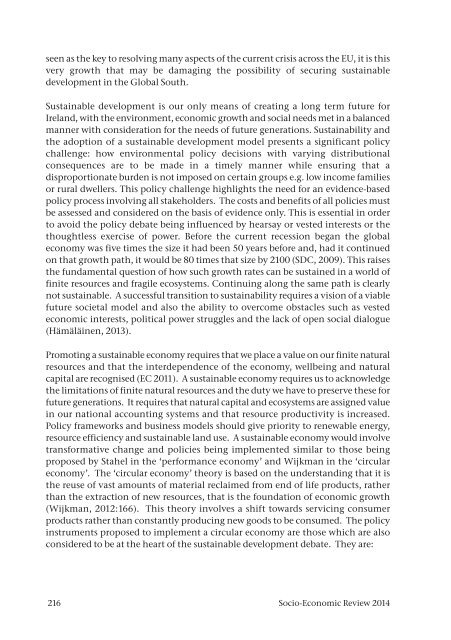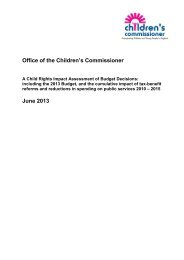2014-04-22 - Socio Economic Review 2014 - Full text and cover - FINAL
2014-04-22 - Socio Economic Review 2014 - Full text and cover - FINAL
2014-04-22 - Socio Economic Review 2014 - Full text and cover - FINAL
Create successful ePaper yourself
Turn your PDF publications into a flip-book with our unique Google optimized e-Paper software.
seen as the key to resolving many aspects of the current crisis across the EU, it is this<br />
very growth that may be damaging the possibility of securing sustainable<br />
development in the Global South.<br />
Sustainable development is our only means of creating a long term future for<br />
Irel<strong>and</strong>, with the environment, economic growth <strong>and</strong> social needs met in a balanced<br />
manner with consideration for the needs of future generations. Sustainability <strong>and</strong><br />
the adoption of a sustainable development model presents a significant policy<br />
challenge: how environmental policy decisions with varying distributional<br />
consequences are to be made in a timely manner while ensuring that a<br />
disproportionate burden is not imposed on certain groups e.g. low income families<br />
or rural dwellers. This policy challenge highlights the need for an evidence-based<br />
policy process involving all stakeholders. The costs <strong>and</strong> benefits of all policies must<br />
be assessed <strong>and</strong> considered on the basis of evidence only. This is essential in order<br />
to avoid the policy debate being influenced by hearsay or vested interests or the<br />
thoughtless exercise of power. Before the current recession began the global<br />
economy was five times the size it had been 50 years before <strong>and</strong>, had it continued<br />
on that growth path, it would be 80 times that size by 2100 (SDC, 2009). This raises<br />
the fundamental question of how such growth rates can be sustained in a world of<br />
finite resources <strong>and</strong> fragile ecosystems. Continuing along the same path is clearly<br />
not sustainable. A successful transition to sustainability requires a vision of a viable<br />
future societal model <strong>and</strong> also the ability to overcome obstacles such as vested<br />
economic interests, political power struggles <strong>and</strong> the lack of open social dialogue<br />
(Hämäläinen, 2013).<br />
Promoting a sustainable economy requires that we place a value on our finite natural<br />
resources <strong>and</strong> that the interdependence of the economy, wellbeing <strong>and</strong> natural<br />
capital are recognised (EC 2011). A sustainable economy requires us to acknowledge<br />
the limitations of finite natural resources <strong>and</strong> the duty we have to preserve these for<br />
future generations. It requires that natural capital <strong>and</strong> ecosystems are assigned value<br />
in our national accounting systems <strong>and</strong> that resource productivity is increased.<br />
Policy frameworks <strong>and</strong> business models should give priority to renewable energy,<br />
resource efficiency <strong>and</strong> sustainable l<strong>and</strong> use. A sustainable economy would involve<br />
transformative change <strong>and</strong> policies being implemented similar to those being<br />
proposed by Stahel in the ‘performance economy’ <strong>and</strong> Wijkman in the ‘circular<br />
economy’. The ‘circular economy’ theory is based on the underst<strong>and</strong>ing that it is<br />
the reuse of vast amounts of material reclaimed from end of life products, rather<br />
than the extraction of new resources, that is the foundation of economic growth<br />
(Wijkman, 2012:166). This theory involves a shift towards servicing consumer<br />
products rather than constantly producing new goods to be consumed. The policy<br />
instruments proposed to implement a circular economy are those which are also<br />
considered to be at the heart of the sustainable development debate. They are:<br />
216 <strong>Socio</strong>-<strong>Economic</strong> <strong>Review</strong> <strong>2014</strong>



